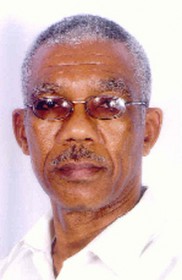Retired Brigadier David Granger has denied any involvement in the military operation during the 1973 general election that resulted in the deaths of two men at No. 63 Village, saying that the Guyana Defence Force (GDF) was at the time only seeking to prevent ballot boxes from being seized.

“I had nothing at all to do with the shooting,” he told Stabroek News yesterday, explaining that he was not in command of the GDF at the time. “I was in command of the base at what used to be Atkinson Field, what became Timehri. So, I was not in charge of seizing any ballot boxes. I was not in charge of the operation.” The 1973 election was one of those that the PNC was widely accused of rigging and employing the army to achieve this.
The announcement on Wednesday of Granger’s interest in being the presidential candidate for the main opposition PNCR at next year’s election prompted former PPP activist Jinnah Rahman to declare him “the worst choice” to represent the party. Further, Rahman alleged that Granger “was responsible for seizing the ballot boxes on the Corentyne, Berbice and the shooting to death of two PPP activists at No. 63 Village in July 1973.” He was referring to Jagan Ramessar and Parmanand Bholanauth, who have since been memorialised as the ‘Ballot Box Martyrs.’ According to Rahman, “Granger’s hands are seriously stained with the blood of these two heroic Guyanese patriots….”
Granger noted that there was a Commission of Inquiry into the case and he advised that Rahman read its findings. “It’s there. The deaths of those boys [were] inquired into,” he said.
He recalled that there had been threats of violence at the election and that “certain political elements” had received instructions to block the roads to prevent the movement of ballot boxes. “I think that the disorder which occurred was the result of those instructions and I think the Board of Inquiry brought it out,” he noted. Granger added that as a result a special operation was mounted in which the aircraft landed on the Corentyne highway, and the ballot boxes were delivered to them. He said the GDF was only performing “a logistical role”— to prevent the ballot boxes from being seized. “The orders were passed by the Guyana Defence Board,” he said. “Just like orders are passed by the Defence Board for the soldiers to go into Buxton or for soldiers to go behind Fineman. The Defence Board passed the orders. I certainly didn’t pass any orders. I wasn’t there. But I know that my colleagues who conducted the operation were people of the highest professional integrity,” he said.
He emphasised that he was not trying to escape blame, saying that the army’s deployment was part of a straight forward military operation in accordance with government instructions to ensure that ballot boxes were delivered by civilian officials. “So the pictures of soldiers carrying boxes into trucks and so on, they were from a logistical function,” he said. “But they had nothing to do with what was in the boxes or determining the results of the election. Soldiers always do what the government tells them to do. That is what soldiers do. ”
Granger has said that uniting the PNCR and the country will be at the top of his list should he be nominated as its presidential candidate for next year’s elections. According to Granger his backers indicated that they were looking for a candidate that can “bring the party together.” He said he has been asked by a “significant part of the party’s membership” to accept the nomination as they feel no other “candidate can unite the party.”
Should the party put him forward as its presidential candidate and should he win the elections, Granger said he would focus on crime and security. “Security is the most pressing issue, people need a safe environment to operate in and the general quality of life needs to be improved,” he said.
Granger retired from military service in 1992, after serving as National Security Adviser to the President and as Commander of the GDF. During his military service, he served as planning officer for the establishment of the Guyana National Service and the Guyana People’s Militia and he also led military delegations to Brazil, Cuba, Germany, Guinea, Korea, Somalia and Yugoslavia. He received the Military Service Star; the Military Service Medal; the Efficiency Medal; the Border Defence Medal; and other service awards.





